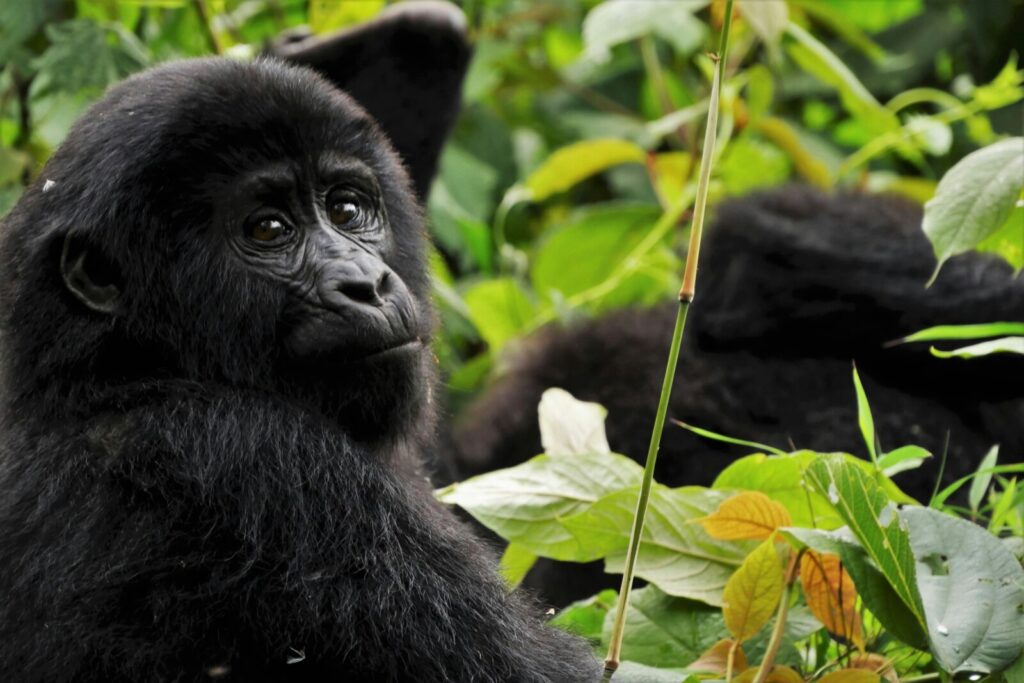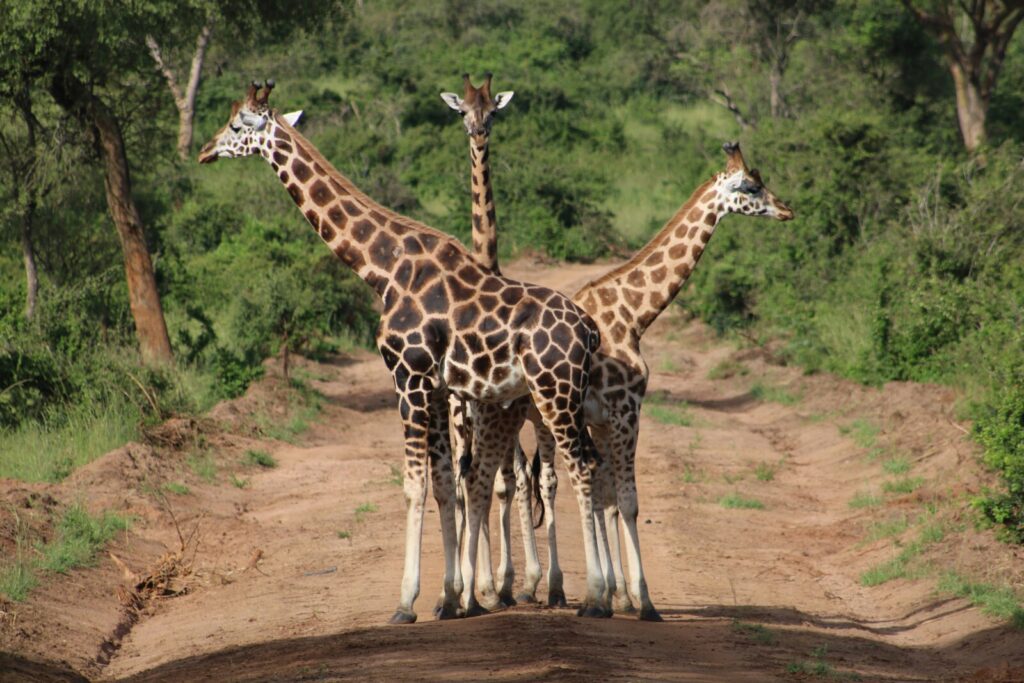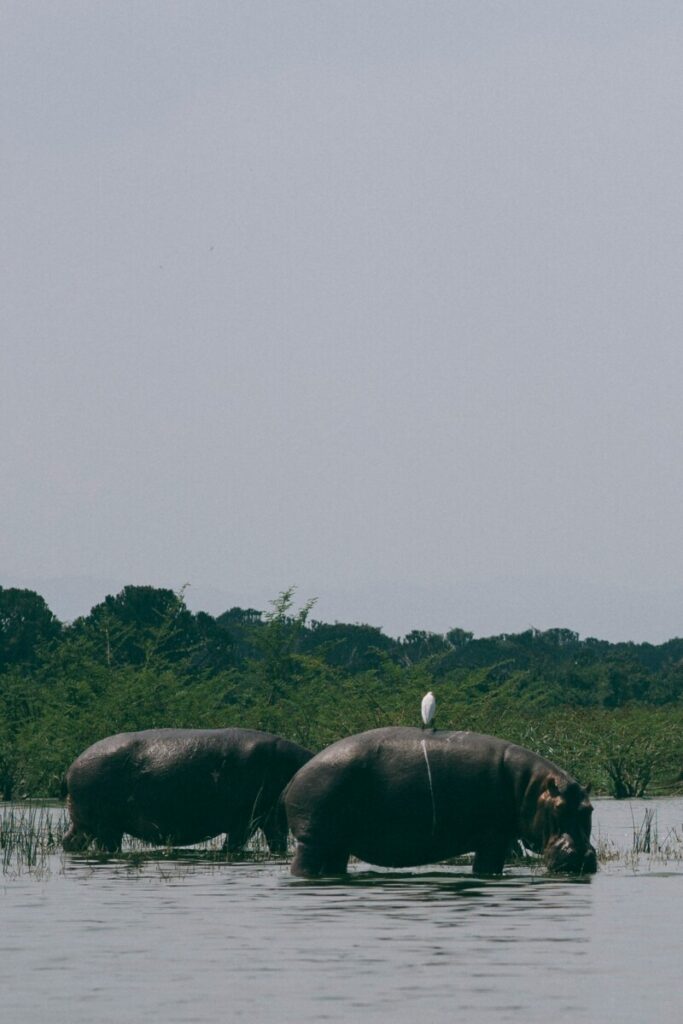Many people choose an African destination for their international volunteering experience—Uganda, Kenya, Tanzania, Senegal…
In these destinations, we work on different projects during the week, while weekends are dedicated to leisure activities. The most popular one, without a doubt, is going on a safari.
Africa is the ultimate safari destination, home to an astonishing biodiversity and some of the most iconic ecosystems on the planet.
Today, we want to tell you about the animals you can see if you choose Uganda for this unforgettable adventure. In this destination, you’ll have the chance to spot the Big Five in some of the country’s most popular national parks: Bwindi Impenetrable National Park, Queen Elizabeth National Park, Murchison Falls National Park, Lake Mburo National Park… AND MANY MORE!

MAMMALS
- Lion: The most popular ones are the climbing lions that climb trees to avoid the heat of the ground, escape from bothersome insects, improve visibility, and flee from potential threats. One of the most popular parks to see them is Queen Elizabeth Park.
- African Elephant: We previously wrote a blog post about this animal, explaining the difference with the Asian elephant. They can also be seen in Queen Elizabeth Park and Murchison Falls. A majestic herbivorous animal that lives in matriarchal herds, and is a very intelligent and sociable species.
- Leopard: Although seeing one is a matter of luck since they are elusive, encountering one is an adrenaline-filled experience. They inhabit various reserves and parks, and spotting one is a true spectacle of nature.
- African Buffalo: Found in most parks, always in herds, and in Uganda there are two species: the savanna buffalo, which is larger, and the forest buffalo, which is smaller and reddish.
- Rhinoceros: Although their presence has been limited due to poaching and habitat loss, they are still considered one of the most impressive animals in Uganda. Both the white and black rhinoceros can be found (you can learn more about their differences and discover much more about their behavior and habitat on the blog). In Uganda, there is the Ziwa Rhino Sanctuary, where there is a successful conservation and breeding program for the Southern White Rhino.
- Hippopotamus: This large herbivorous animal is commonly found in lakes and rivers, such as the Kazinga Channel.
- Rothschild’s Giraffe: A very popular destination is Murchison Falls National Park, where it is quite likely to see these animals as they are easily visible during the day. Seeing them up close and in the wild is another unforgettable spectacle.
- Zebra: Found in many parks, especially in Lake Mburo National Park, it is one of the most attractive animals in the country. If one is spotted, it’s likely to find a herd of up to 20 individuals nearby.
- Antelopes: There are many subspecies in this group, such as impalas, Ugandan kob, elands, and topi. They are very shy, so quiet approaches are important in order to observe their behavior in the wild.
- Warthog: A robust and very distinctive animal, both in appearance and behavior. It’s called a warthog because of the protrusions on its face, a characteristic of males due to their thick skin. They typically live in groups called ‘sounders,’ usually formed by females and their young, while males tend to be more solitary, especially outside the breeding season.
OTHER MAMMALS YOU MIGHT SEE
- Black-backed Jackal: A small carnivore found in open savannas.
- Spotted Hyena: Common in many reserves but difficult to spot as it makes nocturnal appearances, which is why we also recommend experiencing a night safari. Many species venture out at dawn, making it a completely different experience.
- African Civet: Also a nocturnal animal, small and resembling a raccoon.
- Genets: Small, very agile mammals often seen at night in trees.
- Crested Porcupine: A large rodent with spines found in forests and savannas.
And many more, considering that Uganda is home to over 345 mammal species, making it one of the countries with the greatest wildlife diversity.

PRIMATES
- Mountain Gorilla: An iconic species and highly sought after during safaris. In fact, you can go on exclusive excursions to find them. With their imposing size but peaceful nature, encountering them in their natural habitat is the goal of many visitors, who are left speechless upon seeing them. They live in the Virunga mountains and are found in Bwindi Impenetrable National Park.
- Chimpanzee: One of the most intelligent primates and the closest to humans, Uganda is one of the best destinations to find them. They live in areas like Kibale, Budongo, and Kyambura Gorge. They can be spotted in many parks.
- Black-and-white Colobus Monkey: These primates are very special and likely quite different from what you’ve been used to seeing. In fact, Cooperating Volunteers runs a Colobus Monkey conservation program in Diani Beach, Kenya. In Uganda, they inhabit tropical forests and jungles and are an essential part of the forest ecosystem. They are widely distributed across various parks.
OTHER POPULAR PRIMATES
- L’Hoest’s Monkey: Found in Bwindi and Kibale.
- Blue Monkey: Can be seen in various forested areas.
- Olive Baboon
- Patas Monkey
Uganda is a top destination for primate lovers, as it is home to 13 different species, some of which are endemic or endangered.
REPTILES AND OTHERS
- Nile Crocodile: Common in rivers and lakes, one of the most feared crocodile species in Africa. Boat safaris along the Nile River and Lake Victoria are perfect for spotting them.
- Nile Monitor: Can be seen on riverbanks and in forests, this scaly reptile has a venomous bite. The Komodo dragon belongs to the varanid family, so its appearance is very similar.
- Snakes: Uganda is home to 171 different species, but only a small percentage of them are venomous. You can find the Seba’s Python (one of the largest in the country), Green Mamba (venomous and very hard to spot as it camouflages easily), or the Egyptian Cobra (venomous and inhabits savannas and forests), among many others.
OTHER POPULAR REPTILES
- Leopard Tortoise: One of the largest terrestrial tortoises in Africa.
- Jackson’s Chameleon: Endemic to East Africa.
- Cane Toad: Found near bodies of water, they are tricky to spot unless you’re on a walking safari.
Over 140 species can be found in Uganda, with a remarkable variety as the country offers ideal habitats for these animals.
BIRDS
Uganda is a paradise for birdwatching, with more than 1,060 species, ranging from common to rare and endemic species.
Endemic species include:
- Mountain Francolin: A rare species found only in the mountains of this country.
- Rwenzori Mountain Owl: Endemic to the Rwenzori Mountains and one of the most unique species.
- Mountain Cisticola: Also endemic to the Rwenzori Mountains.
There are waterfowl like the Greater Flamingo and Spur-winged Goose, and raptors such as the Osprey and White-headed Vulture.
You’ll also find songbirds and passerines like the Red-necked Bulbul and Red-headed Weaver, as well as migratory birds that create a spectacle with their movement from Europe and Asia.

These are just some of the animals you can see during your safari experience, whether during the day, at night, by car, or on foot.
The true magic of this experience is that, being in their habitat and living freely, you never know which animals will surprise you. But whatever they may be, it will undoubtedly be incredible.
A safari is one of those experiences you must have on your bucket list at least once in your life, especially if you’re an animal lover.




